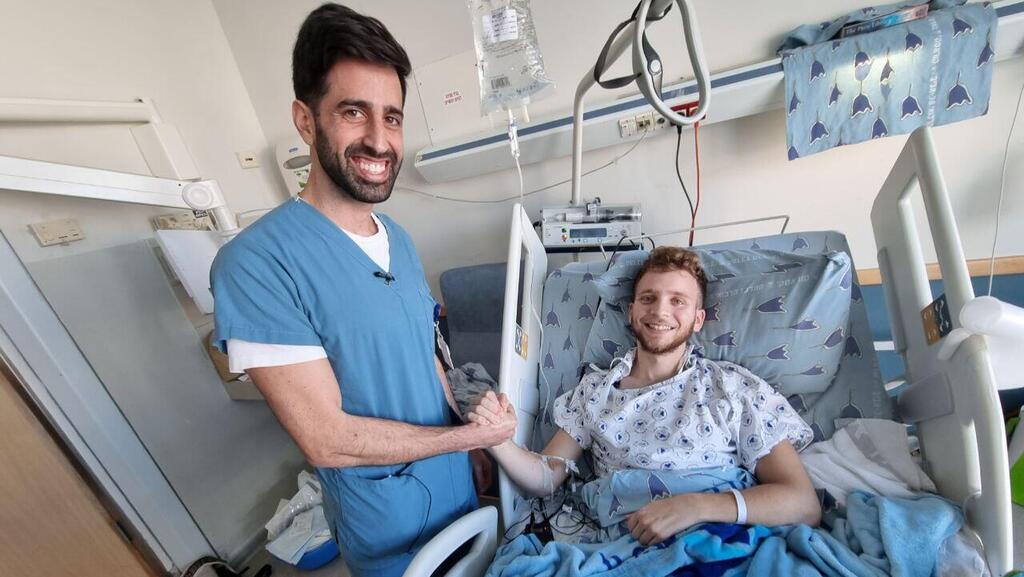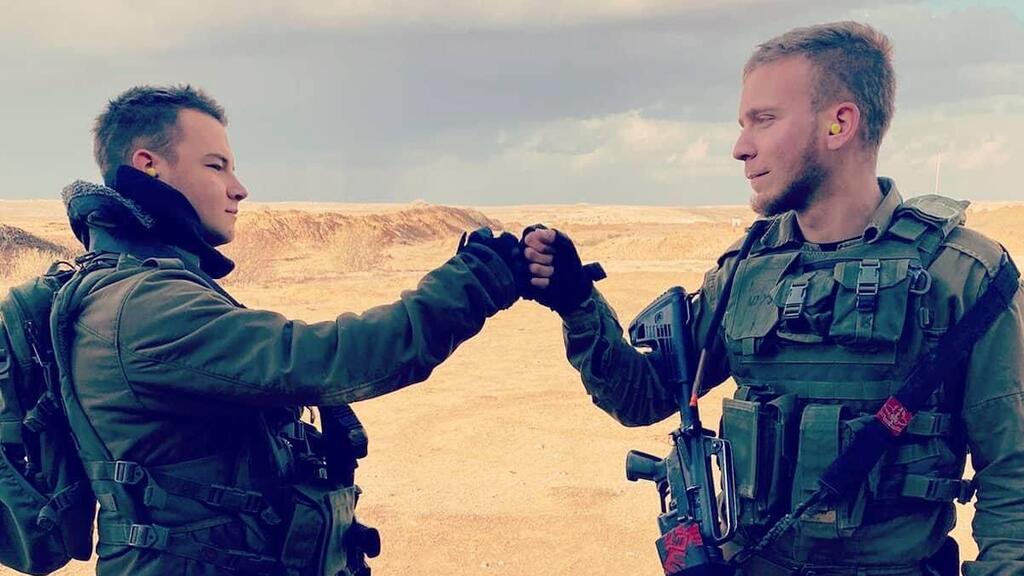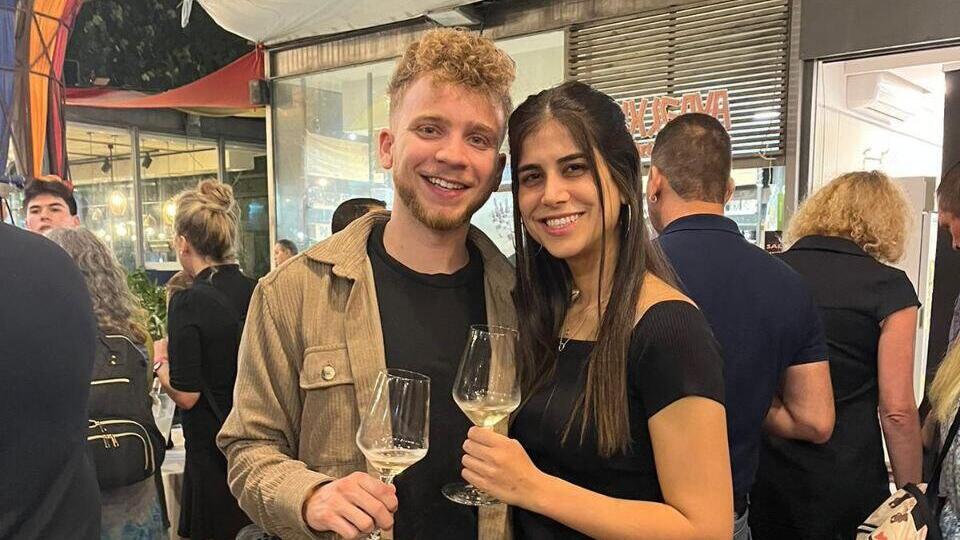Getting your Trinity Audio player ready...
"In the dark nights in Gaza, I would go to sleep with a smile on my face and a lot of satisfaction," recalls Sargeant Major (res.) Yair, 24, from Beit Shemesh. Even now, in the Orthopedic Division at the Sourasky Medical Center in Tel Aviv, his name is well-known thanks to that smile that has never left his face even after a difficult injury following an anti-tank missile hit; and he is always joking with his doctors.
More stories:
Yair, a soldier in the 401st Armored Brigade's 20th Battalion, was called up on October 7 for reserve duty in the middle of a bachelor party weekend with friends. A little over a month later, he found himself fighting a battle for his life.
3 View gallery


SGM Yair greets Dr. Nissan Amzallag of Sourasky Medical Center's Orthopedic Division
(Photo: Assaf Kamar)
Yair is trying to recover from a hip injury, after which - almost against all odds - the medical team managed to save his leg from amputation. "On that dark weekend, we spent Shabbat with friends in honor of a good friend who was supposed to get married. At 10 a.m. I woke up, opened my phone and realized that I was called up for reserve duty. A few hours later, we arrived with our tanks in the staging areas in front of Gaza, we were sent to the Givati Brigade and we waited for the order to go in."
He recalls, "Unfortunately, I was not present at the first entry into the Gaza Strip because they split the company in two, but my friends entered. It's a lot of pressure and you think about them all the time. After two weeks, there was a rotation and it was finally my turn to enter the battles in Gaza. I am the company's liaison and the loader of my tank - which is the most fun job with all the arms and all the physicality. It's the best job in the Armored Corps."
When Yair talks about the operational activity and the battles in which he took part with his fellow tank crew members, his eyes glow and it is clear that he misses and cares for his comrades who are still fighting in Gaza.
"Also in Khan Younis, we were in the advancing force. The 7th Brigade made it halfway and we replaced them to advance into the city. It was already full of shooting and full of action, as they say. All night and all day, we were awake and shooting all the time, we did what was necessary. We had to arrive at a certain point in 16 hours and we arrived much earlier."
"There is one moment of fear, and I think it happens to everyone," recalls Yair. "It's that moment when you cross the border and suddenly everyone goes silent. No one says anything and everyone creates the moment, because suddenly there is this second of 'come on, I'm entering the battle in Gaza.' But as soon as you cross the border, there is no more fear, there is determination in everyone's eyes and high morale. There is a desire to be there and fight and do what is necessary."
When were you injured?
"Ten days after our advance into Khan Younis, my tank had to go out for a change at the border. About 15 minutes into the trip, it started. I didn't hear the explosion, I was probably unconscious for a few seconds, I also don't remember the evacuation because I was on painkillers, a kind of out-of-body experience."
Who rescued you?
"My team, who was slightly wounded and had time to recover and return to fighting in Gaza, quickly rescued me from the tank. Our company commander came with another tank and an angel paramedic who saved my life. I remember the pain and the rescue, I remember almost everything. After initial treatment, I was evacuated with a paramedic and a doctor to a helicopter that landed at the border."
And all this time you are fully conscious?
"It was very important for me to be awake. I had something in my brain that said 'he who does not stay awake dies'."
What's going through your mind? Do you think, I just got screwed? Do you think about the country, friends, family?
"It was divided into several stages. Immediately after the missile hit my tank, all I wanted was to get out of it. During the initial medical treatment, I thought about my girlfriend and family. By the time they took me out with the Namer armored personnel carrier to the helicopter, I was already terribly weak, but I was very happy to be alive. And I told myself that 'I did my part'."
"During the evacuation, I thought I had lost my leg and became disabled. When I woke up after the first surgery, I was glad to be alive. First thing, I checked where my leg was. I was still under the influence of the anesthesia and I asked someone 'where is my leg?' He told me, It's right here.' I saw it and shouted - 'Yes!' Since then I have already had eight surgeries. I know all the medical staff by their first names, including all the anesthesiologists, surgeons, and nurses and the cleaning staff. Everyone is very happy to see me, they like that I smile."
Yair proudly recounts his progress. "Last week, I walked for the first time. It was with an assistance device and it was one of the most exciting things I've experienced in my life. It was a bit strange because my body forgot how to do it. I take half a step and my body stops. It is as if we have to convince it to move and we are working very hard on it in physical therapy. Yesterday, I was able to walk a few steps."
Dr. Nissan Amzallag from the Orthopedic Division at Sourasky checks Yair's wounds and the IV connection and checks up on the state of mind of one of the longest-term and most beloved wounded soldiers in the hospital.
Doctor, how did Yair arrive?
"Yair was airlifted here a month ago. His main injury was to the thigh of his left leg. He underwent a series of surgeries and comprehensive treatment for all the additional injuries from the shrapnel and gunfire in order to control the resulting infection. So, besides the surgical treatment he continues to undergo, here in the Orthopedic Division, he receives all the other treatments, including antibiotics, bandage changes, physical therapy and a wide variety of other treatments. Yair is a charming guy."
"Because of the war, we have lots and lots of hospitalized soldiers and the Orthopedic Division works around the clock to treat them all. Each wounded person brings their personal story and their life and family members and friends. For me, it's a great privilege to take care of them."
When will Yair be able to return home?
"It will take time for Yair to return to normal, there are more treatments and more surgeries ahead of us. He will need combined treatment of orthopedics and plastic surgery, and from there he will go through a long rehabilitation process. At the end of the day, he will go home. Our goal is for him to walk again."
When you return home at the end of a long shift, do you manage to disconnect and find some peace or do the sights and suffering of the wounded haunt you even outside the hospital?
"I worry and think about the patients all the time, even at home, but I also get tremendous satisfaction. Sometimes, at the end of the day, one of the patients comes to me and says: 'Doc, you helped me. Thanks to you, I feel better, I'm in less pain and my wounds have improved.' I'm the one who gets up in the morning."
Yair doesn't intend to let the serious injury break him, and he radiates optimism. "I'm not ready to change my dreams and my ambitions because of the injury. My big dream is for my name to be on something I invented or did, and I'll put the injury aside and get there. I'm ready to die for the people of Israel and I will not hesitate to return to battle if I am called to another war. The soldiers in Gaza need the support of the entire nation, we need unity, friendship and joy. Only together we are strong."
Your girlfriend must have gone through a crazy upheaval.
"As soon as I know I'm out of here and physically capable I plan to propose to her."
Wait, she'll probably read this article and ruin her surprise.
"I'm done with surprises," he laughs. "Noa, I love you. I'm going to propose to you soon, and where it will happen - that will remain a surprise. I'm planning something and thank you very much to all the family by my side; I love you. I want to say thank you to the medical team. I receive the best treatment here, there is no doubt that I am in the best of hands. You can be proud of our doctors and of course also the nurses and the entire medical staff at Sourasky. I am of course not happy to be here, but I am receiving the best treatment available."




